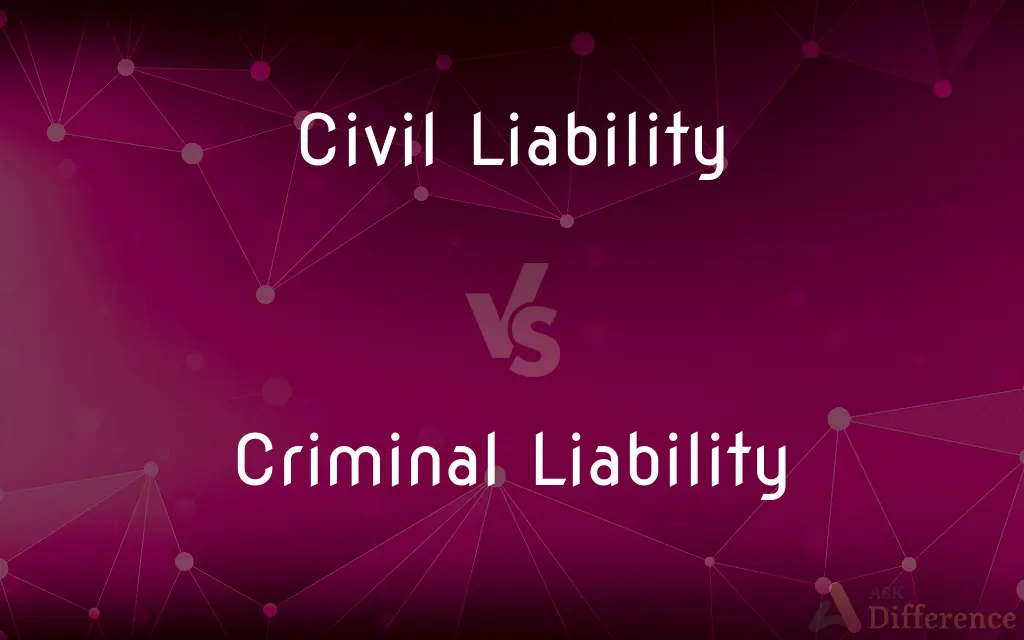Civil Liability vs. Criminal Liability — What's the Difference?
Edited by Tayyaba Rehman — By Fiza Rafique — Published on December 19, 2023
Civil Liability pertains to disputes between individuals or entities, often involving compensation, while Criminal Liability relates to breaches of laws that harm society, potentially resulting in penalties like imprisonment.

Difference Between Civil Liability and Criminal Liability
Table of Contents
ADVERTISEMENT
Key Differences
Civil Liability and Criminal Liability are distinct legal concepts addressing different aspects of wrongdoing. Civil Liability arises when one party's breach of a duty or right results in damage or loss to another, often leading to financial compensation. In contrast, Criminal Liability stems from violations of societal norms codified in criminal statutes, and its consequences might involve punitive actions like fines, community service, or imprisonment.
At their core, Civil Liability and Criminal Liability differentiate in terms of the parties involved. In cases of Civil Liability, the dispute typically arises between private individuals or entities. Conversely, Criminal Liability sees the state or government prosecuting an individual or entity for committing a crime that threatens or harms the broader community.
While both Civil Liability and Criminal Liability address wrongs, the nature and consequences of these wrongs differ. Civil Liability often revolves around compensating the victim for losses or damages suffered. On the other hand, Criminal Liability focuses on punishing the wrongdoer for their actions, emphasizing deterrence, rehabilitation, or retribution.
The standards of proof in court proceedings also vary between Civil Liability and Criminal Liability. Civil cases usually operate on a "preponderance of the evidence" standard, meaning it's more likely than not that one party's claim is true. In contrast, Criminal Liability demands a higher standard of "beyond a reasonable doubt" to secure a conviction.
The remedies and outcomes for Civil Liability and Criminal Liability differ significantly. While Civil Liability might result in monetary compensation, injunctions, or specific performance, Criminal Liability can lead to penalties like incarceration, probation, or mandatory community service, reflecting the gravity of the offense against society.
ADVERTISEMENT
Comparison Chart
Nature of Dispute
Between individuals or entities.
The state/government versus an individual or entity.
Consequences
Compensation for damages or loss.
Punishment like fines, imprisonment, or community service.
Standard of Proof
Preponderance of the evidence.
Beyond a reasonable doubt.
Purpose
Compensate for loss or damage.
Punish and deter criminal behavior.
Initiation
By the aggrieved party.
By the state or government due to societal harm.
Compare with Definitions
Civil Liability
Arises from breaches of civil laws or rights.
The breach of contract led to Civil Liability for the defaulting party.
Criminal Liability
Centers on breaches of statutes protecting societal norms.
The act of fraud led to Criminal Liability due to its breach of societal trust.
Civil Liability
A legal obligation arising from private disputes.
After the accident, John faced Civil Liability for the damages.
Criminal Liability
Legal responsibility for violating criminal laws.
The theft resulted in Criminal Liability for the offender.
Civil Liability
Responsibility to compensate for harm or damage.
The company bore Civil Liability for the environmental harm caused.
Criminal Liability
Implies facing potential punitive actions.
Due to his actions, he was exposed to Criminal Liability and potential jail time.
Civil Liability
Relates to non-criminal disputes between parties.
The landlord's failure to repair led to Civil Liability against the tenant's claim.
Criminal Liability
Arises from actions deemed harmful to society.
Selling illegal substances exposed her to Criminal Liability.
Civil Liability
Often results in financial compensation.
Due to her negligence, she had to bear the Civil Liability and compensate the victim.
Criminal Liability
Enforced by the state or government.
The felony charge brought about Criminal Liability, with the state prosecuting.
Common Curiosities
What is the main purpose of Civil Liability?
The primary purpose of Civil Liability is to compensate victims for losses or damages.
Can one action lead to both Civil and Criminal Liability?
Yes, certain actions, like drunk driving causing injury, can result in both Civil and Criminal Liability.
Who initiates a case for Civil Liability?
Cases for Civil Liability are typically initiated by the aggrieved party seeking compensation.
What typically results from Civil Liability?
Civil Liability often leads to compensation for damages or loss.
Who prosecutes in cases of Criminal Liability?
In cases of Criminal Liability, the state or government prosecutes the offender.
Why is the standard of proof higher in Criminal Liability cases?
Due to the severe consequences like imprisonment, Criminal Liability requires a stronger evidence threshold, ensuring fairness and justice.
Can Civil Liability involve non-monetary remedies?
Yes, Civil Liability can involve remedies like injunctions or specific performance, not just monetary compensation.
Are the penalties the same for Civil and Criminal Liability?
No, Civil Liability generally results in compensation, while Criminal Liability can lead to punishments like jail or fines.
What kinds of actions typically lead to Criminal Liability?
Actions like theft, assault, fraud, or murder, which harm society, can lead to Criminal Liability.
Can a person face jail time for Civil Liability?
Typically, jail time isn't a direct consequence of Civil Liability, which focuses more on compensation.
How do courts determine the amount for Civil Liability?
Courts assess the damages, losses, and sometimes the degree of negligence to determine the amount in Civil Liability cases.
Who bears the burden of proof in Criminal Liability cases?
In Criminal Liability cases, the burden of proof rests on the prosecution to prove guilt beyond a reasonable doubt.
Is negligence a factor in both Civil and Criminal Liability?
Yes, negligence can play a role in both, but its implications and consequences differ between civil and criminal contexts.
Can one evade Criminal Liability by compensating the victim?
No, compensating a victim might address Civil Liability, but Criminal Liability is pursued by the state to address societal harm.
Is Criminal Liability only about serious offenses?
No, Criminal Liability can arise from both misdemeanors (lesser offenses) and felonies (more serious offenses).
Share Your Discovery

Previous Comparison
Pressure Group vs. Interest Group
Next Comparison
Transfer of Shares vs. Transmission of SharesAuthor Spotlight
Written by
Fiza RafiqueFiza Rafique is a skilled content writer at AskDifference.com, where she meticulously refines and enhances written pieces. Drawing from her vast editorial expertise, Fiza ensures clarity, accuracy, and precision in every article. Passionate about language, she continually seeks to elevate the quality of content for readers worldwide.
Edited by
Tayyaba RehmanTayyaba Rehman is a distinguished writer, currently serving as a primary contributor to askdifference.com. As a researcher in semantics and etymology, Tayyaba's passion for the complexity of languages and their distinctions has found a perfect home on the platform. Tayyaba delves into the intricacies of language, distinguishing between commonly confused words and phrases, thereby providing clarity for readers worldwide.














































